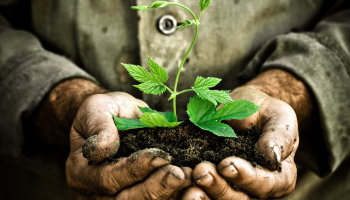- About
- Topics
- Picks
- Audio
- Story
- In-Depth
- Opinion
- News
- Donate
-
Signup for our newsletterOur Editors' Best Picks.Send
Read, Debate: Engage.
Yesterday marked the yearly World Soil Day, organised by the Food and Agriculture Organisation of the United Nations. The theme this year is – unsurprisingly – ‘caring for the planet starts from the ground’. It’s becoming more apparent that one of the last standing hopes in avoiding driving our planet into a catastrophic apocalypse lays in the soil beneath our feet; a resource that is turning scarce as days go by.
It might seem an obviously precious resource, but soil and its crucial role in producing 95% of the world’s food as well as storing water, capturing carbon and controlling weather balance, has only begun to gain traction. The recent COP23 climate change conference in Bonn saw the first time global negotiations on the future of soil were jointly addressed and agreed upon.
The agreement included having the Subsidiary Body for Science and Technological Advice (SBSTA) and the Subsidiary Body for Implementation (SBI) review issues associated with agriculture with the aid of technical expert meetings as well as coherent workshops across nations – with the hope that consistent education will balance the ways in which soil is treated the world over.
The politics of soil goes far beyond local agriculture. As global migration numbers continues to grow, issues around increasing war and natural disaster refugees are those most often depicted in media and on the agenda of western governments, yet currently 10 million individuals have been forced to abandon their homeland because of desertification, deforestation and soil erosion.
There have been attempts to move agriculture away from the basis of soil: the Ocean Reef Group have been growing cabbage, basil, strawberries and beans inside underwater pods situation 100 meters off the coast of the Italian village of Noli. While Nemo’s Garden (the project’s name) is an innovative and successful example of various ways food can be produced for a growing number of mouths to feed and with reducing volumes of land for agriculture, it also ignores the inherent connection between life on earth and soil.
It is said that inside a tablespoon of healthy soil there are more organisms than there are people on earth. With that in mind, shifting global attention from that of technological advancements to the ‘simplistic’ basics of soil doesn’t seem like a bad idea. Caring for the planet really does start from the ground.
